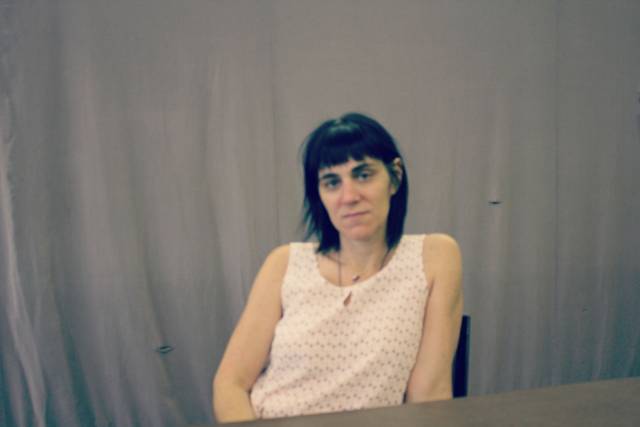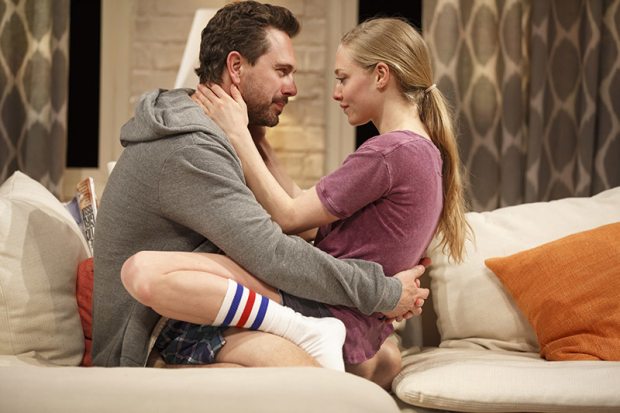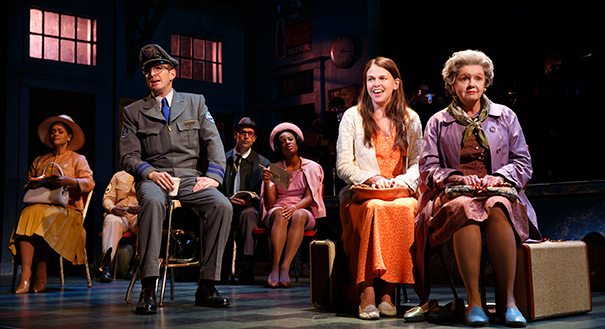

Leigh Silverman’s directorial trademark can be summed up in one word: bold. Her theatre credits include plays and musicals as varied as Lisa Kron’s Well, Tanya Barfield’s Blue Door and David Henry Hwang’s Chinglish, all of which have in common the strong ideas behind them. Silverman fearlessly approaches projects that would turn other directors off, such as tackling Jeanine Tesori’s complex musical Violet, which she guided all the way to a Tony nomination for Best Revival (not to mention a nomination for her as Best Director). In the spring and summer of 2015, the restless director is bringing to the stage two works by some of America’s greatest writers, Neil LaBute and Andrew Lippa. Silverman is doing the world premiere of LaBute’s The Way We Get By starring Thomas Sadoski and Amanda Seyfried in her theatre debut. In July she’s headed to City Center’s Encores with a production of Lippa’s cult classic The Wild Party starring Sutton Foster.
We had the chance to talk to Silverman as she prepared for the opening night of The Way We Get By and discussed the subjects that attract her, her collaborations with LaBute, Foster and Tesori, as well as how she prepared Seyfried to make her stage debut.
You get a script from Neil, what happens next? Do you work closely with him, or does he vanish and let you put your vision on the stage?
Neil is an extremely collaborative playwright, so he did a lot of rewrites when we were in rehearsals, he was here every day working away. Once we started previews we did a lot of work with the script in previews, he’s really involved, in the best way as far as I’m concerned. He was very interested in seeing my interpretation of the play, he was really interested in helping to support whatever vision I had and he was always open to ideas the cast had as well. I think his reason for doing new plays is to have all these people come together and make this thing. I’ve worked with all kinds of writers, some who love to rewrite, some who hate it, some who only rewrite once they’ve seen the show with an audience...there are so many kinds of collaborations. For me this was an incredibly fruitful collaboration because I felt he was very in it with me.
Since you brought up collaborations, I spoke to Sutton Foster earlier this year and she mentioned you as a favorite collaborator.
Oh, that’s very nice.
You’re reuniting with her for The Wild Party as well. You’ve also worked a lot with Tanya Barfield and Lisa Kron, so would you say there is such a thing as an “ideal collaborator”?
I don’t think that there’s a formula, I feel that the best collaborations I’ve had, whether they’ve been writers, actors, designers, is that we’ve shared a similar aesthetic, and a rigor. Certainly the writers that I’ve worked with several times including David Henry Hwang, Lisa Kron, Jeanine Tesori and Tanya, from the writing side I feel they’re people who wanted to write the best thing possible. They work tirelessly and have really honest and engaged processes. On the acting side, definitely Sutton is like that, so are Amanda and Tommy [Sadoski], they are people who are interested in the thing being good than in them being right. As a director that’s what matters to me the most, it’s always about the work, not about the ego.
Before I forget, I need to ask something, since you’ve worked with Jeanine Tesori and Lisa Kron before. Were you at any point considered to direct Fun Home?
Oh no, never. I just was a fan from the beginning, Lisa and I were actually in the middle of working on her play Well when she and Jeanine started writing Fun Home, so I heard the very first words of that show and have been a crazy fan ever since.
With Neil’s work there’s always a sense of dread, I kept thinking the roommate would show up and kill the two leads for instance…
It’s true! We get a lot of mileage in the play because people keep waiting for some murder to happen, or some horrible thing. I do feel that we have a lot of suspense because of Neil’s reputation and it makes the ending all the more surprising because I feel it’s one of his most hopeful plays, and also very romantic. He’s such a good writer, he writes the way people talk and he’s so honest with his characters that that’s why I feel they sometimes do terrible things, because people can be terrible to each other, and in this play these people find a way to be good to each other, which is unusual in him.
The play lacks any cynicism too. How do you achieve a balance between people’s expectations of Neil’s work and your own vision?
Hopefully you go to theatre to be surprise and delighted, part of what’s interesting with my collaboration with Neil is that since we’ve never worked together before and I usually direct very different plays, this is an unusual work situation for both of us. I think there’s some great chemistry that’s come out of this.

Theatre captures “real time” unlike any other artform, especially in a play like this. Can you talk about the challenges that came with this?
For me it’s very unusual, I can’t remember the last play in real time that I was even attracted to. I tend to prefer more “theatrical” work, so this play feels very theatrical to me because of the real time. We don’t jump ahead three years, you are watching people tousle with each other in a way people do when they’re in relationships. Their struggle is so human and interestingly it feels very theatrical because my vision of the play originally was that it would feel like they were the only two people awake on earth. To make the void in the background make it feel like they’re our first humans, the envelope of the play has a very existentialist theme and I feel you can only represent this through a very naturalistic way onstage. I hope the theatrical twist is more subliminal, to make it feel as if as the day is dawning, these two people will figure something out, that they’re going to come to consciousness.
Thomas has a lengthy stage career, but this is Amanda’s theatre debut, and as much as I like her film work, I don’t think she’s ever given a better performance than in this play. As a director how do you work with actors who have no previous stage experience?
It’s so interesting because when you’re working with someone doing theatre for the first time, you want them to have the most perfect experience. You feel so responsible for them and even though I’ve worked with many people who’ve never been onstage before, I think I’ve never encountered someone who has worked this hard or has understood so much, so quickly. Both the technical aspects - where to stand, how to talk - but also how to inhabit the stage in an honest way, Amanda has proven herself as such a stage creature in a way that I didn’t know whether it would be true or not. We did a reading early on when we were first thinking about doing the play, we wanted to see if Tommy and Amanda would have chemistry and if we would all be on the same page, and it was so clear that even if she had never done this she had so much potential. One of the ways in which she proved she was ready was that she kept telling me “I haven’t worked hard enough” and it was fascinating, because I look at her and she has such a major career that she didn’t have to do this. She didn’t have to do a play that was so hard, a two-hander done in 90 minutes of real time...she understood almost instantly what was required of her and worked tirelessly to get there. She was a real joy! She was someone who’d never had to rehearse a character in chronological order, and she had to learn how to hold on to an emotion she first encountered in page 2, all the way to page 6, and she’d never had to do that before. She was so open and available, so deeply interested in it, that I felt honored, and relieved franky. I’ve worked with Tommy before and he’s the perfect partner for her too, I knew he’d help me take care of her, and now they can take care of each other in a beautiful way.
Most of your work has been doing original plays, but you have taken on several revivals in the last few years including The Heidi Chronicles, Violet and The Wild Party. Why this new interest in revivals?
With Violet and The Wild Party, I’ve been calling those revisicals (laughs) because they’ve been done, but they’re getting this new interpretation and that has been really exciting to me! I’m super excited about The Wild Party because I think Andrew [Lippa] has done some amazing work on it, and it’s such a beautiful score, plus we have an amazing cast. It’s also this huge dance musical that we have to do with just eight days of rehearsals, so it’s fast and furious and challenging. Most of my career has been on new plays, I’ve done 30-something world premieres, so moving into the revisicals felt like the logical next step for some reason. The Heidi Chronicles was unusual but it was Joe Dowling’s last season at the Guthrie and it was the play that was starting that season and it was a play I’d always wanted to do so I couldn’t say no.
You mentioned that you wanted to do Heidi because it was very relevant and compared it to your experience being the only woman nominated for a Best Director Tony Award in 2014. Pam McKinnon’s Broadway revival closed so fast that it made me think of your statement. Was this also partly what made you want to do the play so much?
Yeah, I think the way that Wendy [Wasserstein] wrote about the issues women face, in having to compete all the time with each other and with men, should feel dated, and it doesn’t, which is sad. Just recently in the news we saw how the ACLU is going after Hollywood because only like 2% of the movies that came out last year were directed by women, the statistics are shocking! I think that there’s particularly the places in theatre where we’ve seen change is in the non for profit sector, where the gender parity is more balanced. The big shows that cost a lot of money are still directed by men.

I can’t help but produce fantasy versions of shows I love and since you’re about to do your second show with Sutton Foster, I thought you two would be perfect to do a chronicle of the American woman throughout the decades kind of thing. You did Violet which is the 60s, now you’re doing flappers with The Wild Party….
I like it! I like it! Alright let’s get somebody to write that, I’m into it!
I realized that no female director has done Gypsy on Broadway and since Sutton has already mentioned she wants to play it in the future, maybe that’s another entry!
It’s true, she’s so amazing, she’s really great. There’s nobody like her, she’s like a unicorn.
Are there any shows you’re working on?
I feel very excited about The Wild Party, I have a bunch of other projects that are sort of circling for next season, I’m also feeling very excited to have a little bit of time off (laughs) I’ve been working a lot and I’ve been feeling a little bit tired. I’m looking forward to working my ass off in Wild Party, take a little break and then see where things go...